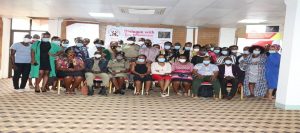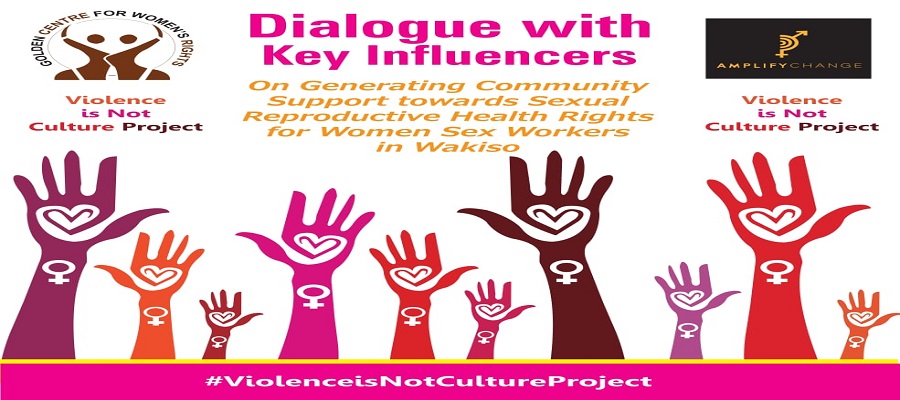Golden Centre for Women’s Rights on July 30th 2020, held a dialogue meeting with key influencers on generating community support towards sexual reproductive health rights and an end to gender based violence among marginalized women in Wakiso.
The event that was funded by Amplify Change aimed at promoting sexual reproductive health rights of urban women refugees and native women sex workers through prevention of gender based violence. The project under which this dialogue fell is themed Violence is not Culture.
According to the project’s concept paper, gender inequalities and GBV are among the key factors in sexual reproductive health vulnerabilities for women and girls in Wakiso and the district holds a high number of femicides.
In most cases culture including religions and traditional cultures are major driver of poor Reproductive health outcomes and GBV. This dialogue seeks to promote a conversation and understanding of the link between culture, gender and reproductive health as well seek increased and more public support for SRH and less negative statements from key influencers
Some of the major issues identified were sexual objectification and depictions of women sex workers as castaways, derogatory or trivializing reporting/preaching about women’s reproductive choices, appearance, dress code and behavior and reproducing and perpetuating gender stereotypes with respect to victims of gender-based violence
To address these issues, Golden Centre for Women’s Rights invited key stakeholders who included women sex workers, media personnel, local leaders, police, religious leaders, artists and health workers.

To further understand the project, Kuchu Times spoke to Shira Natenda and below we reproduce the excerpts
KT: GBV is an issue that cuts across the nation, why did you zero down on Wakiso?
SN: Wakiso has a high number of femicide and most of them were reported to be sex workers. Since 2017, police management has been battling violent crimes and criminal gangs in the municipality after a dozen incidents when women were raped before they were murdered.
To make matters worse the society blamed the victims instead of those perpetrators of the murders. And this was due to the cultural Religious ideologies and restrictions on sex work that influence society's treatment of women who engage in sex work.
At least every day we receive a case of a sex worker attacked and accessing justice or health is also a challenge.
Additionally, Wakiso District has the highest criminal rates according to Uganda police. This indicated that there was a knowledge gap on human rights for sex workers for simply being human beings thus we had to take this project to Wakiso District.
KT: Besides dialogue, what other proactive steps are you taking to engage policy makers and influencers like police and MPs on matters of GBV?
SN: We partner with networks such as Uganda Key Population Consortium, Alliance of Women advocating for Change (AWAC), Human Rights Awareness and Promotion Forum among other partners such as Women Positive Empowerment Initiative (WOPEIN), Trans Youth Initiative (TYI) among others to write press statements calling out injustice against women sex workers.
- We are documenting sex workers GBV experiences and disseminating them to key stakeholders. https://africanfeminism.com/sex-workers-face-heightened-stigma-in-the-shadow-of-covid-19- emergency-response/
- We also participate in media documentary a platform we use to air out sex workers GBV experiences that need to be addressed.
- We do Voluntary community work in Wakiso at police with a view to build rapport and change their view of who sex workers.
- Organize social networking events and invite them. All this is done to set a platform for Dialogue and negotiation.
KT: As an organization that works closely with key populations, what special strategies do you have to address GBV within these communities?
SN: We have trained 35 women sex workers in gender based violence response and they are the GBV Change Agents from Kajjansi, Nabweru, Wakiso, Bulenga, Kyengera, Entebbe and Nsangi.
We are conducting community awareness meetings with mainstream society in Wakiso on GBV and SRHR for women sex workers. We intend to sensitize communities that sex workers are human beings and have rights that must be respected. Such as right to life, right to health, Freedom from inhuman degradation, right to liberty, right to find a family and right to fair hearing.
KT: Most people that boldly speak out on GBV issues are actually abusers within their personal spaces, do you have any strategies in place to call them out or even address this issue?
SN: We have a GCWR safe guarding Policy that protects those we serve from harassment, exploitation and abuse.
We also have a sexual harassment policy that includes an incident register in our human resource manual that is issued to every step. A staff member subjected to harassment by a fellow staff can submit this complaint and cases are handled by an independent committee. This person and committee helps with investigation and notifying authorities or escalating the matter to higher governance levels in the organization.
We hold monthly beneficiary feedback meetings with a view to listen to members’ views on our organization performance and suggestions for new programs.




